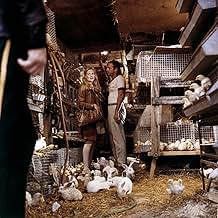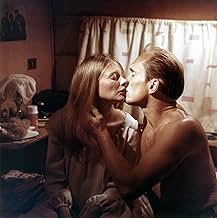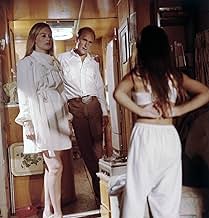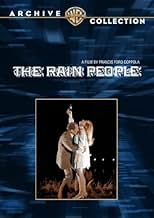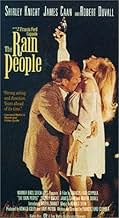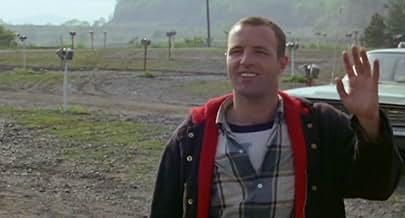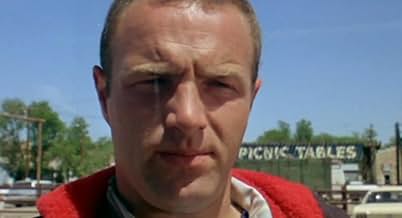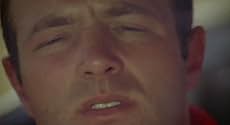NOTE IMDb
6,8/10
4,4 k
MA NOTE
Lorsqu'une femme au foyer découvre qu'elle est enceinte, elle s'échappe et quitte la ville à la recherche de liberté pour réévaluer ses choix de vie.Lorsqu'une femme au foyer découvre qu'elle est enceinte, elle s'échappe et quitte la ville à la recherche de liberté pour réévaluer ses choix de vie.Lorsqu'une femme au foyer découvre qu'elle est enceinte, elle s'échappe et quitte la ville à la recherche de liberté pour réévaluer ses choix de vie.
- Réalisation
- Scénario
- Casting principal
- Récompenses
- 1 victoire au total
Laura Crews
- Ellen
- (as Laurie Crews)
Garrett Cassell
- Farmer
- (non crédité)
Eleanor Coppola
- Gordon's Wife
- (non crédité)
Avis à la une
A 30-ish wife on Long Island (Shirley Knight) needs to just get away and so enters her station wagon and drives west. To where? She doesn't know, but she picks up an ex-college football player (James Caan) before meeting a motorcycle cop (Robert Duvall).
"The Rain People" (1969) was made three years before Francis Ford Coppola became famous with "The Godfather." It was his first movie in which he had total creative control, writing and directing on the road without producers breathing down his neck. The story was inspired by Francis' mother curiously leaving home for a few days when he was a kid. It's about a woman's haphazard search for freedom from the manacles of domestic life. Unlike the domineering male protagonists of "Patton" (which he wrote), the Corleone patriarchs and Kurtz in "Apocalypse Now," Coppola shows us here several females manipulating men: Natalie with Kilgannon, Gordon and even Vinny; Ellen with Kilgannon and her father; and Rosalie with her dad.
Interestingly, it's the express opposite of Francis' previous movie, the fun "Finian's Rainbow," which was based on the 1947 Broadway hit. One is an energetic musical with a large cast while this has an everyday, depressing tone, made with a small cast & crew. While neither were successful at the box office, they both went on to garner cult followings after Coppola's great success in the 1970s-90s (of course he had a few movies that didn't do so well, but what else is new?).
I can see where many viewers would find "The Rain People" dull, but it features a daring premise and has historical significance, not to mention some notable cast members. Plus, it's a quality period piece for the late '60s. In regards to the commendable premise, Natalie loves her husband, but is uncertain about the responsibility of having his child and so instinctively flees the scene. Ironically, Killgannon becomes her surrogate 'child' on her road odyssey wherein she struggles with her obligations.
Concerning the 'historical significance,' the industry proudly cites "Stand Up and Be Counted" as the first flick to address women's liberation, which it overtly does. But this came out three years prior and few people noticed at the time because it's so covert. It was ahead of its time.
Francis originally intended to include a scene at the end to clear up what Natalie decides to do from there, but it wasn't needed because everything is explained in her monologue. Listen.
It runs 1 hour, 41 minutes, and was shot over the course of five months in several American states with a 10-person crew (along with a smattering of locals). The locations include: Garden City (opening shot), Manhattan (Lincoln Tunnel) & Hofstra University, New York; the Pennsylvania Interstate; Harrisonburg, Virginia (restaurant scene); Clarksburg (the drive-in theater) & Weston, West Virginia; Chattanooga, Tennessee (the parade); Brule (the burning house) & Ogallala (the reptile ranch), Nebraska; and other places for exterior shots.
GRADE: B/B-
"The Rain People" (1969) was made three years before Francis Ford Coppola became famous with "The Godfather." It was his first movie in which he had total creative control, writing and directing on the road without producers breathing down his neck. The story was inspired by Francis' mother curiously leaving home for a few days when he was a kid. It's about a woman's haphazard search for freedom from the manacles of domestic life. Unlike the domineering male protagonists of "Patton" (which he wrote), the Corleone patriarchs and Kurtz in "Apocalypse Now," Coppola shows us here several females manipulating men: Natalie with Kilgannon, Gordon and even Vinny; Ellen with Kilgannon and her father; and Rosalie with her dad.
Interestingly, it's the express opposite of Francis' previous movie, the fun "Finian's Rainbow," which was based on the 1947 Broadway hit. One is an energetic musical with a large cast while this has an everyday, depressing tone, made with a small cast & crew. While neither were successful at the box office, they both went on to garner cult followings after Coppola's great success in the 1970s-90s (of course he had a few movies that didn't do so well, but what else is new?).
I can see where many viewers would find "The Rain People" dull, but it features a daring premise and has historical significance, not to mention some notable cast members. Plus, it's a quality period piece for the late '60s. In regards to the commendable premise, Natalie loves her husband, but is uncertain about the responsibility of having his child and so instinctively flees the scene. Ironically, Killgannon becomes her surrogate 'child' on her road odyssey wherein she struggles with her obligations.
Concerning the 'historical significance,' the industry proudly cites "Stand Up and Be Counted" as the first flick to address women's liberation, which it overtly does. But this came out three years prior and few people noticed at the time because it's so covert. It was ahead of its time.
Francis originally intended to include a scene at the end to clear up what Natalie decides to do from there, but it wasn't needed because everything is explained in her monologue. Listen.
It runs 1 hour, 41 minutes, and was shot over the course of five months in several American states with a 10-person crew (along with a smattering of locals). The locations include: Garden City (opening shot), Manhattan (Lincoln Tunnel) & Hofstra University, New York; the Pennsylvania Interstate; Harrisonburg, Virginia (restaurant scene); Clarksburg (the drive-in theater) & Weston, West Virginia; Chattanooga, Tennessee (the parade); Brule (the burning house) & Ogallala (the reptile ranch), Nebraska; and other places for exterior shots.
GRADE: B/B-
I have a letter from Ms. Knight, who went to college with my older sister. In it, she tells of the hardships of making this film. She, herself, was pregnant--an interesting conjunction with the movie's plot--and the novice director was unsure, fairly green, and having great difficulties with all the decisions, logistics, etc. They were on the move all the time, and it was a very difficult shoot.
The film, however, with a strong debut for James Caan, remains effective and affecting. It's a great showcase for the talent that Ms. Knight has demonstrated her entire career--on television, in movies and on the stage, where she won the Tony for "Kennedy's Children."
This film has aged well.
The film, however, with a strong debut for James Caan, remains effective and affecting. It's a great showcase for the talent that Ms. Knight has demonstrated her entire career--on television, in movies and on the stage, where she won the Tony for "Kennedy's Children."
This film has aged well.
Early Coppola with sublime cast that most folks never got to see (a pity). There's some wonderful things going on in this one - Shirley Knight's best performance (an underrated actress), a road trip in the late 1960's, James Caan very restrained and moving, Robert Duvall in a part he was born to play (edgy, lonely, motorcycle cop), and a touching script with F. Coppola behind the wheel.
If this had been made five years LATER by some nobody, it would have been a smash (so much for timing). Anyway, I recommend this to all people who don't need outer-space explosions and bad mother-in-law jokes or a billion dollar budget to sit for a few hours and watch a story unfold. Give this one a chance if you can find it!
If this had been made five years LATER by some nobody, it would have been a smash (so much for timing). Anyway, I recommend this to all people who don't need outer-space explosions and bad mother-in-law jokes or a billion dollar budget to sit for a few hours and watch a story unfold. Give this one a chance if you can find it!
Francis Ford Coppola wrote and directed this stunningly personal story of a married woman's flight from her husband--and the reality that perhaps the youthful glee and excitement of her younger years are behind her. We learn little about this woman's marriage except that she has been feeling her independence slipping away as of late; she's also recently learned she's pregnant, which has further complicated her heart (she doesn't want to be a complacent wifey, despite the maternal way she speaks to her husband over the phone). She meets two men on her journey: a former college football hero who--after an accident during a game--has been left with permanent brain damage, and a sexy, strutting motorcycle cop who has a great deal of trouble in his own life. The clear, clean landscapes (as photographed by the very talented Wilmer Butler) are astutely realized, as are the characters. Shirley Knight, James Caan, and Robert Duvall each deliver strong, gripping performances, most especially since these are not very likable people in conventional terms. Some scenes (such as Knight's first call home from a pay-phone, or her first night alone with Caan where they play 'Simon Says') are almost too intimate to watch. Coppola toys with reality, turning the jagged memories of his characters into scrapbooks we've been made privy to. He allows scenes to play out, yet the editing is quite nimble and the film is never allowed to get too heavy (there are at least two or three very frisky moments). It's a heady endeavor--so much so that the picture was still being shown at festivals nearly five years later. Some may shun Coppola's unapologetic twisting of events in order to underline the finale with bitter irony, however the forcefulness and drive behind the picture nearly obliterate its shortcomings. *** from ****
Of all his films it would appear that Francis Ford Coppola is particularly fond of "The Rain People", a very modest and some might say 'arty' drama he made early in his career. Like a lot of American films popular at the time it's a 'road movie' with Shirley Knight as the young wife who ups and leaves her husband in the middle of the night, gets in her car and drives West for no paricular reason she can think of, meeting on her journey James Caan, (brain-damaged football player), and Robert Duvall, (randy motorcycle cop). She also happens to be pregnant and, like so many Americans in movies at the time, has gone off to 'find herself'.
Coppola says it was a personal project and there are some people who think it's his first masterpiece but it wasn't a hit and despite Coppola's name on the credits has become something of a lost movie. Knight is excellent as she mopes about and, you might say, teasing any man who comes her way while Duvall and especially Caan match her at every turn. You could say it's a quintessential American film of its time, a 'movie-brat' movie if there ever was one and Coppola's first real 'signature' picture, (though I do have a soft-spot for the wonderful "Finian's Rainbow" which preceeded it). If you do get a chance to track this down it is certainly well worth seeing.
Coppola says it was a personal project and there are some people who think it's his first masterpiece but it wasn't a hit and despite Coppola's name on the credits has become something of a lost movie. Knight is excellent as she mopes about and, you might say, teasing any man who comes her way while Duvall and especially Caan match her at every turn. You could say it's a quintessential American film of its time, a 'movie-brat' movie if there ever was one and Coppola's first real 'signature' picture, (though I do have a soft-spot for the wonderful "Finian's Rainbow" which preceeded it). If you do get a chance to track this down it is certainly well worth seeing.
Le saviez-vous
- AnecdotesThe parade scene was filmed in Chattanooga, Tennessee on Memorial Day. The students in the band were not aware of what was happening. In fact, reading the lips of a majorette, she can be seen asking, "Who was that guy?" as James Caan was weaving through the parade.
- GaffesWhen Natalie first leaves her husband, she drives into a tunnel and emerges from on the west side of Manhattan. That is, she has driven east through the Lincoln Tunnel, presumably heading east. But immediately after, she stops at a phone booth to call her husband, saying she is in Pennsylvania, which is in the opposite direction. Had the intention to suggest a westward journey, she could have driven west through the tunnel to emerge in New Jersey.
- Citations
Natalie Ravenna: You are the most obedient man I've ever met in my life. Look at me. Aren't you?
Jimmy Kilgannon: Yes.
Natalie Ravenna: Aren't you?
Jimmy Kilgannon: Yes.
Natalie Ravenna: Aren't you?
Jimmy Kilgannon: Yes.
Natalie Ravenna: Aren't you?
Jimmy Kilgannon: Yes.
Natalie Ravenna: Alright.
- ConnexionsEdited into Filmmaker (1968)
Meilleurs choix
Connectez-vous pour évaluer et suivre la liste de favoris afin de recevoir des recommandations personnalisées
- How long is The Rain People?Alimenté par Alexa
Détails
Box-office
- Budget
- 750 000 $US (estimé)
Contribuer à cette page
Suggérer une modification ou ajouter du contenu manquant

Lacune principale
By what name was Les gens de la pluie (1969) officially released in India in English?
Répondre

